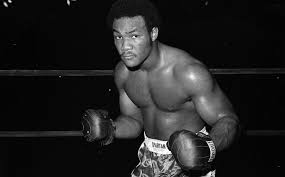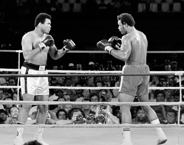It is with profound sadness that we read of the passing of George Foreman, the legendary heavyweight boxing champion, at the age of 76, as confirmed by an Instagram post from his family on Friday. Foreman, whose extraordinary career included an Olympic gold medal, a dominant rise to the heavyweight title, and a remarkable comeback at 45, leaves behind a legacy that has inspired generations of boxing enthusiasts worldwide. Yet, as we honour his incredible achievements, it is also a poignant moment to reflect on the fading presence of boxing in India, where the sport is losing ground, with several prestigious schools shutting down their boxing programmes over the years.
Early Life and Rise to Glory
Born in Marshall, Texas, Foreman overcame a troubled youth, dropping out of school at 15 to join the Job Corps, where he worked as a carpenter and bricklayer. It was there he discovered boxing, initially taking up the sport “just to show my friends I wasn’t afraid,” as he later wrote on his website. His natural talent shone through quickly, leading to an Olympic gold medal at the 1968 Mexico City Games after just 25 amateur fights. Turning professional, Foreman won his first 37 fights, earning a shot at the undisputed heavyweight champion, Joe Frazier, in 1973’s “The Sunshine Showdown.” In a stunning upset, Foreman knocked Frazier down six times in two rounds, prompting referee Arthur Mercante to stop the fight—a moment immortalised by Howard Cosell’s iconic call: “Down goes Frazier! Down goes Frazier! Down goes Frazier!” Foreman claimed the heavyweight title and solidified his dominance with early knockouts of José Roman and Ken Norton.
The Rumble in the Jungle and a Spiritual Turn
Foreman’s reign faced its defining test in 1974’s “Rumble in the Jungle” against Muhammad Ali in Kinshasa, Zaire. Billed as the greatest sporting event of the 20th century, the bout drew 60,000 fans and became a global spectacle, later celebrated in the Oscar-winning documentary When We Were Kings. Ali’s rope-a-dope tactics and eighth-round knockout handed Foreman his first significant defeat, marking a turning point in his career.
After a 1976 rematch win over Frazier and a loss to Jimmy Young in 1977, Foreman retired at 28 following a profound spiritual awakening. Suffering from exhaustion in his dressing room, he heard a voice asking, “Do you believe in God?” This experience led him to dedicate the next decade to ministry, founding the Church of the Lord Jesus Christ in Houston and, in 1984, the George Foreman Youth and Community Center.
An Astonishing Comeback
By 1987, financial pressures prompted Foreman’s return to boxing after a decade away. Over four years, he notched 23 consecutive victories, re-establishing himself as a heavyweight contender. Though he lost to Evander Holyfield in 1991, Foreman earned another title shot in 1994 against Michael Moorer. At 45, wearing the same red trunks from his loss to Ali, he defied expectations. After trailing for nine rounds, Foreman landed a devastating combination in the 10th, knocking out Moorer to reclaim the heavyweight title and become the oldest champion in boxing history. This triumph capped a career that bridged two eras, showcasing his resilience and enduring appeal.
Beyond the Ring
Foreman’s fame grew beyond boxing through ventures like the Foreman Grill, which earned him millions after Salton Inc. paid $137.5 million for naming rights in 1999, and his comedic role in the ABC sitcom George. In retirement after 1997, he returned to preaching and cherished his friendship with Ali, a bond that deepened from rivalry to love. “We fought in 1974; that was a long time ago. After 1981, we became the best of friends. By 1984, we loved each other,” Foreman said in 2012. When Ali passed in 2016, Foreman served as an honorary pallbearer, a testament to their profound connection.
Boxing’s Decline in India
As we celebrate Foreman’s remarkable journey, it is sobering to consider the state of boxing in India. Once a nurturing ground for talent, the sport has seen a steady decline, with prestigious schools closing their boxing programmes over the years. This erosion deprives young athletes of the chance to emulate legends like Foreman, whose story of overcoming adversity could inspire a new generation. In contrast to Foreman’s global legacy, the fading infrastructure in India dims the hope of producing future champions, underscoring a stark disparity between boxing’s past glories and its present struggles.
A Lasting Legacy
George Foreman’s death marks the end of an era for a man who transcended boxing to become a cultural icon. His life—from a troubled youth to Olympic gold, two-time heavyweight champion, and beloved entrepreneur—embodies the power of perseverance. As we mourn his loss, we also reflect on the need to preserve boxing’s vitality, particularly in places like India, where its decline threatens to extinguish the dreams of aspiring fighters. Foreman’s legacy endures, a reminder of what the sport can achieve with support and dedication.



